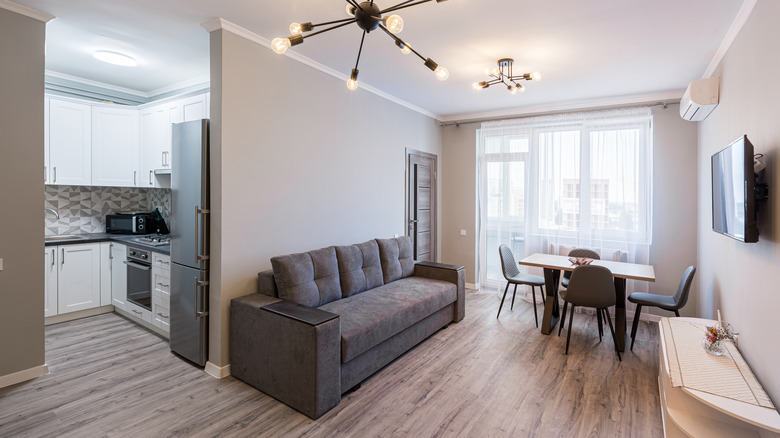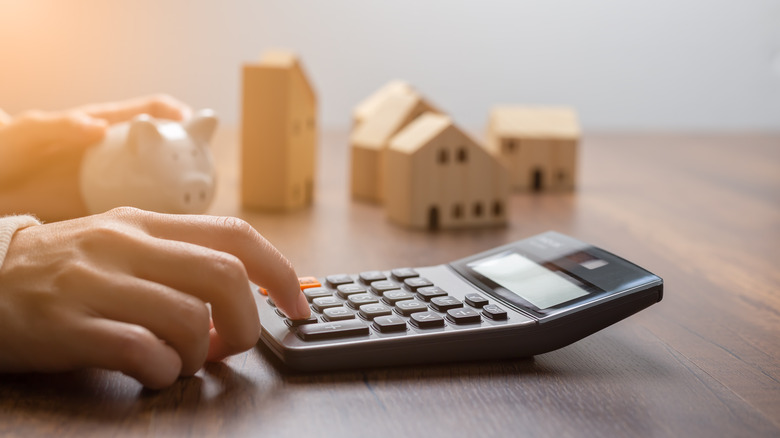What Are The Benefits Of Living In A Studio Apartment?
Everyone needs a little space for themselves. If you are looking for a place to live but don't need a whole lot of square footage, then you may be enticed by all the benefits a studio apartment offers. If you are confused about the exact definition of a studio apartment, it's essentially a whole living space consisting of one room, according to Apartment Guide. That means that your living room, dining area, kitchen, and bedroom are all in one length of open-concept living. The only zone that would be walled off is your bathroom, for obvious reasons. This is opposed to a one-bedroom apartment, which has a separate closed-in area for a bedroom. With regards to a bachelor apartment, it shares much of the same qualities as a standard studio, however, it will have much less square footage.
A studio apartment is perfect for those who can't justify having a massive place to live. Generally, the size of a traditional studio apartment won't get much bigger than 600 square feet. Whether you lead a more simple life and don't need additional space for your possessions, or you live in a big city and want to be close to the action, this type of living arrangement could be just right for you. Let's take a look at some of the other advantages there are to choosing to live in a studio apartment.
It's cheaper
One huge advantage to living in a studio apartment is that the rental costs are much cheaper than those of one-bedroom apartments or most shared homes. Depending on the state you reside in and the size of the apartment itself, it can widely vary what those expenses are. According to Statista, the District of Columbia has the highest average rental fees for a studio apartment at $1625. This is followed by Hawaii at $1291, California at $1280, and New York at $1261. On the low end of the spectrum, Arkansas has the lowest monthly rent at a mere $577, with Kentucky close behind at $612.
However, rental prices are not the only way living in smaller digs can conserve your money. There are also additional savings you will see in the hydro and utility bills as well. Because the space is smaller, it is reasonable that the occupant will be using less heat and water than those who dwell in a larger abode would. Depending on the state you live in and the exact square footage of the apartment, you could be looking at an average cost of $0.10 per square foot, as per Rent. There are also lower costs involved when it comes to home furnishings as you won't need large items to fill the room. Having tighter living quarters may force you to live a more simplified and therefore frugal way of life, which in the end can help you to not waste extra funds.
You have more privacy
If you are on your own or are adopting a more minimalist lifestyle and want to live in a studio apartment, there is another huge advantage, which is that the whole place is yours. Unlike a one or two-bedroom where you may be sharing the living space with roommates in order to cut down on the cost of rent, having a studio apartment to yourself can be highly rewarding. When it comes to privacy, a smaller apartment offers a personal sanctuary away from the bustling world outside your home. It can be designed and decorated to fit your exact style and needs so that you are surrounded by comfort and tranquility.
Although there can be some drawbacks to living on your own in a smaller space, such as loneliness and the possibility of feeling confined in a tight area, there can be some mental health benefits as well. In relation to living a minimalist lifestyle where there is more of a focus on sustainability and less on consumer expenditures, there can actually be a link to increased well-being, according to VeryWellMind. Having a small studio apartment in balance with time outdoors, allowing natural light into the space, as well as some plants in the home, could lead to positive mental health.
Easy to clean
Another incredible bonus to living in a studio apartment is how easy it is to clean. With larger apartments, condos, or houses that have plenty of square footage, that is just extra surface area that can get dirty. This means that you need to dedicate time in your schedule to sweep, mop, dust, vacuum, and wipe down multiple rooms and, in some cases, multiple floors' worth of living space. According to the New York Post, the average American family household spends almost six hours a week cleaning their home. However, if you live in a small studio apartment where square footage is minimal, then you could probably stick to a cleaning schedule that is a fraction of this time.
In a home where your living room shares space with your bedroom, and your kitchen is just a short distance away, you could find that your cleaning is done in one fell swoop. This can be more favorable than spreading the chore out throughout the week. Less time spent doing housework could instead be put toward doing other activities. Also, a smaller living space could make it less likely for there to be clutter around the home, which could lead to bigger messes and more reasons to tidy. With no extra storage and space to spare, one would have to be a little pickier about what they keep in their living area so as to not feel overcrowded or boxed in.



